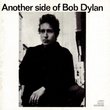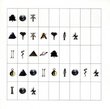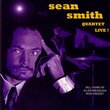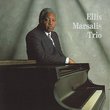| All Artists: Enrique Granados, Johann Sebastian Bach, Alexander Scriabin, Bill Evans, Gabriel Faure, Claus Ogerman, Frederic Chopin Title: Bill Evans Trio with Symphony Orchestra Members Wishing: 1 Total Copies: 0 Label: Polygram Records Release Date: 10/25/1990 Genres: Jazz, Special Interest, Pop, Classical Styles: Cool Jazz, Modern Postbebop, Bebop, Opera & Classical Vocal, Chamber Music, Forms & Genres, Concertos, Historical Periods, Baroque (c.1600-1750), Modern, 20th, & 21st Century, Instruments, Reeds & Winds Number of Discs: 1 SwapaCD Credits: 1 UPCs: 042282198327, 0042282198327, 042282198310, 042282198341 |
Search - Enrique Granados, Johann Sebastian Bach, Alexander Scriabin :: Bill Evans Trio with Symphony Orchestra
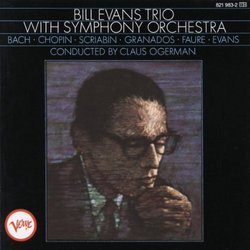 | Enrique Granados, Johann Sebastian Bach, Alexander Scriabin Bill Evans Trio with Symphony Orchestra Genres: Jazz, Special Interest, Pop, Classical
Throughout his career, pianist-composer Bill Evans successfully melded Bud Powell's fiery bop-paced technique with the lyricism and harmonic language of the French impressionists Ravel and Debussy. So it was only natural t... more » |
Larger Image |
CD DetailsSynopsis
Amazon.com Throughout his career, pianist-composer Bill Evans successfully melded Bud Powell's fiery bop-paced technique with the lyricism and harmonic language of the French impressionists Ravel and Debussy. So it was only natural that he would record a session that combines the jazz and classical traditions.Released in 1965, this date features Evans's trio with drummer Larry Bunker, who, three decades later, guest-starred on Diana Krall's When I Look in Your Eyes, and the sensitive bassist Larry Bunker. They're augmented by the azure-tinged arrangements by the famed conductor Claus Ogerman, who worked his magic with artists from Antonio Carlos Jobim to Frank Sinatra. The result of this union is a swinging and seamless interplay in which improvisation becomes spontaneous composition, and vice versa. The linearity and logic of Evans's lines erase centuries of musical distance from the works of Bach, Chopin, Granados, Fauré, and Scriabin, with the trio's trademark telepathy expressed in 4/4 and 3/4 time signatures and light Latin tinges. Evans's haunting compositions, "My Bells" and "Time Remembered," imbued by Ogerman's ethereal strings, are the jewels of this delightful recording, whose brilliance has increased with time. --Eugene Holley Jr. Similarly Requested CDs
|
CD ReviewsThomas Zink Thomas C. Zink | Long Beach, CA USA | 06/23/2000 (4 out of 5 stars) "Easily one of the most daring ventures in crossover jazz, this recording was always one of Bill's favorites. Though not without is failings, it is nontheless a brilliant meeting of the minds between Claus Ogerman and Bill Evans, with Ogerman's orchestral arrangements alone being worth the price of the C.D. The trio is swinging and interacting well, although (probably due to the nature of recording with a whole orchestra in a large studio) not at the level of say "The Village Vangard" sessions. Actually one of the greatest drawbacks of the CD is the recorded sound of the trio - the piano in particular. This was probably due to the nature of recording a jazz trio live alongside an orchestra. Once past these minor distractions, however, the CD is a beautiful interweaving of the classical and Jazz traditions taking some of the best elements of each and creating a new blend. Of course to purists of either tradition such an attempt is almost bound to elicit disapointment, but to those with an open mind there is so much in the way of beautiful music that the CD is a constant joy. Although not extremely well know, Evan's knowlege of the classical tradition was deep and broad, as evidenced by his (and Ogerman's) choice of material. The selections range from Bach and Chopin to Faure and Scriabin with the addition of 3 original compositions - all of which are notable for their beautiful melodies and sensative arrangements. There is not a long list of succesful or well recieved attemps to modify the classics into contemporary arrangements, but this is not to say the idea is without legitimacy. Certainly Broadway show tunes (which are the consistent staple for jazz musicians) in their modified version as recorded by say Miles Davis or John Coltrane have about as much (or perhaps even less) similarity to the original version as do these arrangenments to the classics from which they were taken. In either case, the resulting music in the hands of the masters, be they Miles, Evans, or Orgeman is a pleasure to listen to." One for the Ages MICHAEL ACUNA | Southern California United States | 08/09/2001 (5 out of 5 stars) ""The Bill Evans Trio with Symphony Orchestra" was one of the first recordings I ever heard...EVER. My Mon used to play the LP while she was carrying me so I really do mean first. With that in mind it has never been far from my CD player for as long as I can remember. From all reports this was a troubled recording session with the arranger and conductor of record, Claus Ogerman having trouble controlling all the elements specifically the pick up orchestra and vocal soloist. Sometimes great things come out of great conflict to paraphrase an old saying. Because, despite all of this this is one of the most glorious recordings ever produced. The Ogerman arrangements are lush and beautiful to the point of distraction. Evans chose the perfect composers to compliment his style and that of his trio. Listen to his rendition of Faure's Pavane or Granados' Granadas. And Ogerman and Evans have also composed two of the tracks themselves. Gorgeous. Lie back on your sofa, turn the volume up, open a bottle of Pinot Noir and let this music take you away." Bill Goes 'Symphonic' MikeG | England | 06/09/2004 (4 out of 5 stars) "This is an unusual Bill Evans recording, as it combines his trio with a "symphony orchestra" playing arrangements by Claus Ogerman of several "classical" themes along with two of Evans's most haunting originals: "Time Remembered" and "My Bells". Not that there's much of a classical feel to the orchestrations: apart from the Vaughan Williams/Shostakovich overtones of Ogerman's "Elegy", the orchestral music is more reminiscent of a glossy 1960s/70s film score. There's some attractive woodwind and french horn, but on some of the tracks the large string section might be a bit too lush for some tastes. Fortunately, on most tracks the orchestra confines itself to stating the theme at the opening and in a few places playing a fairly discreet accompanying role, but generally keeping out of the way of Evans's improvisations. So the main "fusion" interest lies in what Evans does with the themes in his solos.One of the minor oddnesses of the album is the way in which, on some tracks, the beginning of Evans's solo launches into a very different tempo and mood from the one just established in the orchestra's theme statement. Sometimes - as on Faure's Pavane - this creates a musically effective contrast; elsewhere - as on "Granados" - it leaves you feeling too sharply aware of the incongruity rather than empathy between the different musical worlds being brought together. Maybe that's partly why the most satisfying of the "classical" tracks are the Bach Sicilienne and "Blue Interlude" (on Chopin's C minor Prelude): each solo seems to grow organically out of its theme and both themes inspire Evans to some excellent improvisation. Listen, for example, to the way in which he exploits the "bluesy" aspect of the Chopin as his solo builds to its climax. Evans's own "My Bells" is another high spot of the album - an attractively nostalgic modal theme tastefully arranged for the orchestra, leading to a gently swinging solo and a rubato restatement of the theme by Evans before a wistful coda. There's certainly a lot of absorbing, beautiful playing from the Evans trio here, including a high level of melodic invention and incomparable rhythmic subtlety from the pianist. But the appeal of the album will largely depend on what you think of the orchestra's part in the proceedings. It's probably one to try before you buy."
|

 Track Listings (8) - Disc #1
Track Listings (8) - Disc #1